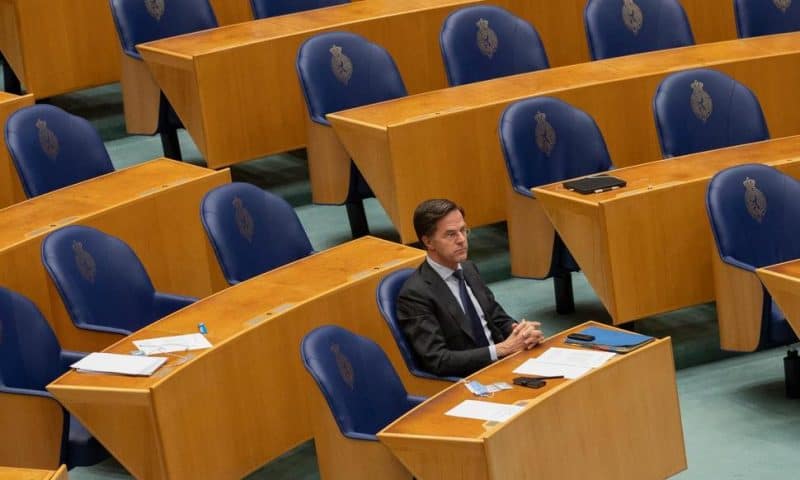The process of forming a new Dutch governing coalition following last month’s general election has to start anew.
THE HAGUE, Netherlands — Dutch Prime Minister Mark Rutte needs a political reboot only two weeks after a major election victory because new questions about his trustworthiness are undermining the process of forming a new coalition government.
Rutte, who has been in power for more than a decade and is seeking to build his fourth governing coalition, narrowly survived a no-confidence motion in the early hours of the morning after a marathon debate in parliament in which he claimed to not remember talking about a critical Christian Democrat lawmaker. Rutte last week publicly denied discussing the lawmaker at all.
Opposition lawmakers accused prime minister of lying and of wrecking public trust in the country’s politicians.
Rutte denied lying and vowed to work hard to rebuild trust. He plans to continue looking to form a new coalition, but that could prove difficult after two of the key parties he would seek to enlist tabled a motion of censure against him that was supported by a large majority in the 150-seat lower house of parliament.
“I have gotten the message and taken it to heart,” said Rutte, who is sometimes called the Teflon premier for his ability to avoid scandals sticking to him.
It was a stunning fall from grace for Rutte, coming just over two weeks after his conservative party won the most seats in parliament in the election, putting him in line to become the country’s longest-serving prime minister if he can create a new coalition.
If he wants to achieve the feat, he will have to mend bridges first.
“My trust in Mr. Rutte has been seriously dented today,” Sigrid Kaag, leader of the centrist D66 party told Parliament in the early hours of Friday. “The distance between him and me is wider. I regret that.”
D66 finished second in the elections and is a current member of Rutte’s coalition.
The country’s Christian Democrats party, a favored coalition partner for Rutte, co-sponsored the censure motion, but left open the possibility of working together.
“It is crucial that we restore trust,” Christian Democrat leader Wopke Hoekstra said.
Lawmakers are now expected to install a new official to restart coalition talks, which are expected to take months.
The coalition crisis comes against a backdrop of rising numbers of coronavirus infections despite a lockdown that has lasted months. More than 16,700 people are confirmed to have died of COVID-19 in the country and Rutte’s government faced harsh criticism for the slow start of its vaccination campaign.
Central to the crisis is Christian Democrat lawmaker Pieter Omtzigt, who has long been a thorn in the side of Rutte with his critical questions about scandals that have dogged the prime minister in recent years.
Lawmakers accused Rutte of seeking to sideline Omtzigt in preliminary coalition talks after one of the two officials leading the talks was photographed carrying notes including the legible line: “Position Omtzigt, function elsewhere.”
After the note was photographed, Rutte told reporters he hadn’t discussed Omtzigt in coalition talks. But he did, according to notes made by civil servants that were published before the debate that started Thursday.
Rutte said in the debate that he didn’t remember that part of the discussion and had answered reporters’ questions “in good conscience.”
“I am not standing here lying. I am telling the truth,” Rutte said.
Rutte apologized to Omtzigt and pledged: “Where trust has been violated … I will work hard to restore it.”
Omtzigt wasn’t present for the debate. He is taking time off, citing exhaustion.
Kaag said she had seen a “pattern of forgetfulness, amnesia” from Rutte over his more than a decade in office.
“How can you, in the greatest crisis that we face in the Netherlands, restore the trust that has again been damaged?” Kaag asked.

